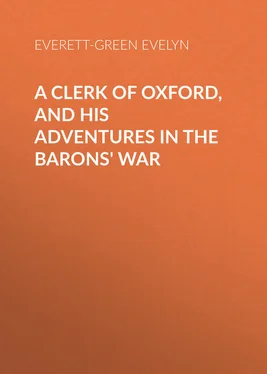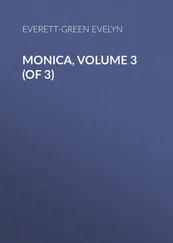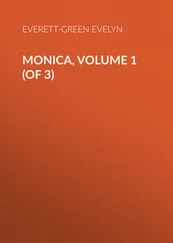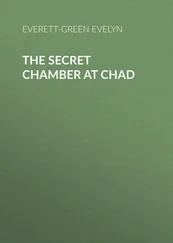Evelyn Everett-Green - A Clerk of Oxford, and His Adventures in the Barons' War
Здесь есть возможность читать онлайн «Evelyn Everett-Green - A Clerk of Oxford, and His Adventures in the Barons' War» — ознакомительный отрывок электронной книги совершенно бесплатно, а после прочтения отрывка купить полную версию. В некоторых случаях можно слушать аудио, скачать через торрент в формате fb2 и присутствует краткое содержание. Издательство: Иностранный паблик, Жанр: foreign_antique, foreign_prose, на английском языке. Описание произведения, (предисловие) а так же отзывы посетителей доступны на портале библиотеки ЛибКат.
- Название:A Clerk of Oxford, and His Adventures in the Barons' War
- Автор:
- Издательство:Иностранный паблик
- Жанр:
- Год:неизвестен
- ISBN:нет данных
- Рейтинг книги:3 / 5. Голосов: 1
-
Избранное:Добавить в избранное
- Отзывы:
-
Ваша оценка:
- 60
- 1
- 2
- 3
- 4
- 5
A Clerk of Oxford, and His Adventures in the Barons' War: краткое содержание, описание и аннотация
Предлагаем к чтению аннотацию, описание, краткое содержание или предисловие (зависит от того, что написал сам автор книги «A Clerk of Oxford, and His Adventures in the Barons' War»). Если вы не нашли необходимую информацию о книге — напишите в комментариях, мы постараемся отыскать её.
A Clerk of Oxford, and His Adventures in the Barons' War — читать онлайн ознакомительный отрывок
Ниже представлен текст книги, разбитый по страницам. Система сохранения места последней прочитанной страницы, позволяет с удобством читать онлайн бесплатно книгу «A Clerk of Oxford, and His Adventures in the Barons' War», без необходимости каждый раз заново искать на чём Вы остановились. Поставьте закладку, и сможете в любой момент перейти на страницу, на которой закончили чтение.
Интервал:
Закладка:
Evelyn Everett-Green
A Clerk of Oxford, and His Adventures in the Barons' War
CHAPTER I
THE DIE CAST
"My son," spoke a gentle voice from behind the low, moss-grown wall, "we must not mourn and weep for those taken from us, as if we had no hope."
Face downwards upon the newly-made mound of earth lay a youth of some fifteen or sixteen summers. His slight frame was convulsed by the paroxysm of his grief; from time to time a strangled sob broke from his lips. The kindly-faced monk from the Priory hard by had been watching him for some time before he thus addressed him. Probably he now saw that the violence of the outburst was spent.
The youth started upon hearing himself addressed, and as he sprang to his feet he revealed a singularly attractive face. The brow was broad and massive, indicating intellectual power. The blue eyes beneath the pencilled arch of the delicate eyebrows looked out upon the world with a singular directness and purity of expression. The features were finely cut, and there were strength and sweetness both in the curved, thoughtful lips, and in the square outline of the jaw. The fair hair clustered in curling luxuriance about his head, and fell in sunny waves to his shoulders. His hands were long and white, and looked rather as though they had wielded pen than weapon or tool of craftsman. Yet the lad's habit was that of one occupying a humble rank in life, and the shoes on his feet were worn and patched, as though by his own apprentice hands. Beside him lay a wallet and staff, upon which the glance of the monk rested questioningly. The youth appeared to note the glance, yet it was the words addressed to him that he answered.
"I think it is rather for myself I weep, my father. I know that they who die in faith rest in peace and are blessed. But for those who are left – left quite alone – the world is a hard place for them."
Father Ambrose looked with kindly solicitude at the lad. He noted his pale face, his sunken eyes, the look of weary depression that seemed to weigh him down, and he asked gently, —
"What ails thee, Leofric, my son?"
"Everything," answered the youth, with sudden passion in his tones. "I have lost everything in the world that I prized. My father is dead. I have no home. I have no fortune. All that we had is swallowed up in paying for such things as were needful for him while he lay ill. Even that which he saved for masses for his soul had to go at the last. See here, my father, I have but these few silver pieces left in all the world. Take them, and say one mass for him, and let me kneel at the door of the chapel the while. Then will I go forth into the wide world alone, and whether I live or die matters nothing. I have no one in the wide world who will know or care."
But the monk gently put back the extended hand, and laid his own kindly upon the head of the youth.
"Keep thy money, my son. The mass shall be said – ay, and more than one – for the repose of thy father's soul. He was a good man and true, and I loved him well. That pious office I will willingly perform in memory of our friendship. But now, as to thyself. Whither goest thou, and what wilt thou do? I had thought that thou wouldst have come to me ere thou didst sally forth into the wide world alone."
There was a faint accent of reproach in the monk's voice, and Leofric's sensitive face coloured instantly.
"Think it not ingratitude on my part, my father," he said quickly. "I was coming to say good-bye. But that seems now the only word left to me to speak in this world."
"Wherefore so, my son? why this haste to depart? The old life has indeed closed for thee; but there may be bright days in store for thee yet. Whither art thou going in such hot haste?"
"I must e'en go where I can earn a living," answered Leofric, "and that must be by the work of mine own hands. I shall find my way to some town, and seek to apprentice myself to some craft. These hands must learn to wield axe or hammer or mallet. There is nothing else left for the son of a poor scholar, who could scarce earn enough himself to feed the pair of us."
Father Ambrose looked at the lad's white fingers, and he slightly shook his head.
"Methinks thou couldst do better with those hands, Leofric. Hast never thought of what I have sometimes spoken to thee, when thou hast been aiding me with the care of the parchments?"
The lad's face flushed again quickly; but his eyes met the gaze fastened upon his with the fearless openness which was one of their characteristics.
"My father, I could not be a monk," he said. "I have no call – no vocation."
"Yet thou dost love a quiet life of meditation? Thou dost love learning, and hast no small store for thy years. It is a beautiful and peaceful life for those who would fain flee from the trials and temptations of the world. And the Prior here thinks well of thee; he has never grudged the time I have spent upon thee. I shall miss thee when thou art gone, Leofric; life here is something too calm and same."
There was a touch of wistful regret in the father's tones which brought back the ready tears to Leofric's eyes. After his own father, he owed most to this kindly old monk, though it had never for a moment struck him that the teaching and training of a bright young lad had been one of the main interests in that monotonous existence.
"That is what I have felt myself," he answered quickly. "I love the calm and the quiet, the books and the parchments. I shall bless you every day of my life for all your goodness to me. But I would fain see the great world too. I have heard my father and others speak of things I would fain see with mine own eyes. It breaks my heart to go, yet I cannot choose but do so. I dare not ask to come to you, my kindest friend, my second father. I could not be a monk. I should but deceive and disappoint you were I to seek an asylum with you now."
Father Ambrose sighed slightly as he shook his head; but he made no attempt to influence the youth. Perhaps he loved him too well to press him to enter upon a life which had so many limitations and drawbacks.
Yet he would not let him go forth upon his travels with so small a notion of what lay before him. He led him into the refectory, where strangers were entertained, and had food brought and set before him. The lad was hungry, for he had of late undergone a very considerable mental strain, and had had little enough time or thought to spare for creature comforts. The long illness of his father, a man gently born, but of very narrow means, had completely worn him out in body and mind; and now, when thrown penniless upon the world, there had seemed nothing before him but to wander forth with wallet and staff, and seek some craftsman who would give him food and shelter whilst he served a long and perhaps hard apprenticeship to whatever trade he chanced upon.
He spoke again of this as he sat in the refectory, and again Father Ambrose shook his head.
"Thou art not of the stuff for an apprentice to some harsh master; thou hast done but little hard work. And think of thy skill with brush and pen, and thy knowledge of Latin and the Holy Scriptures; thy sweet voice, and thy skill upon the lute. What will all these serve thee, if thou dost waste thy years of manhood's prime at carpenter's bench or blacksmith's forge?"
Leofric sighed, and asked wistfully, —
"Yet what else can I do, my father?"
"Hast ever thought of Oxford?" asked Father Ambrose, rubbing his chin reflectively. "There be lads as poor as thou that beg their way thither and live there as clerks, being helped thereto by the gifts of pious benefactors. They say that the King's Majesty greatly favours students and clerks, and that a lad who can sing a roundelay or turn an epigram can earn for himself enough to keep him whilst he wins his way to some honourable post. Hast ever thought of the University, lad? that were a better place for thee than a craftsman's shop."
Читать дальшеИнтервал:
Закладка:
Похожие книги на «A Clerk of Oxford, and His Adventures in the Barons' War»
Представляем Вашему вниманию похожие книги на «A Clerk of Oxford, and His Adventures in the Barons' War» списком для выбора. Мы отобрали схожую по названию и смыслу литературу в надежде предоставить читателям больше вариантов отыскать новые, интересные, ещё непрочитанные произведения.
Обсуждение, отзывы о книге «A Clerk of Oxford, and His Adventures in the Barons' War» и просто собственные мнения читателей. Оставьте ваши комментарии, напишите, что Вы думаете о произведении, его смысле или главных героях. Укажите что конкретно понравилось, а что нет, и почему Вы так считаете.












